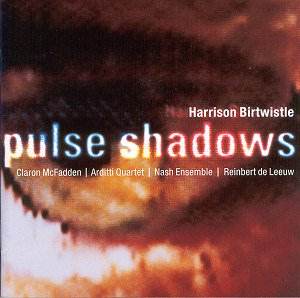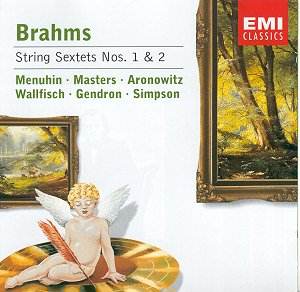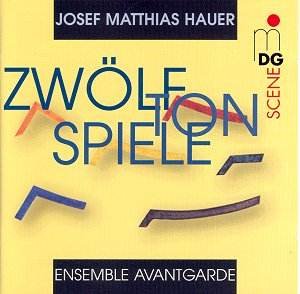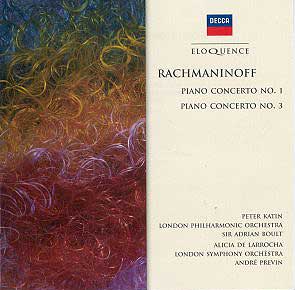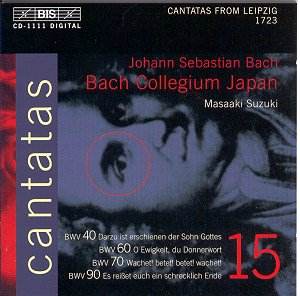 Composer: Johann Sebastian Bach
Composer: Johann Sebastian Bach
Works: Cantata No. 40, “Darzu ist erschienen der Sohn Gottes”, BWV 40; Cantata No. 60, “O Ewigkeit, du Donnerwort”, BWV 60; Cantata No. 70, “Wachet! betet! betet! wachet!”, BWV 70; Cantata No. 90, “Es reißet euch ein schrecklich Ende”, BWV 90
Performers: Yukari Nonoshita, soprano; Robin Blaze, countertenor; Gerd Türk, tenor; Peter Kooij, bass; Bach Collegium Japan; Masaaki Suzuki, conductor
Recording: Rec: September 2000, Kobe Shoin Women’s University, Japan.
Label: BIS
The sacred cantatas of Johann Sebastian Bach, composed during his tenure in Leipzig, stand as monumental testaments to his theological depth and musical ingenuity. Volume 15 of Masaaki Suzuki’s ongoing survey of these works, featuring four cantatas from 1723, captures a pivotal moment in Bach’s career, where he adeptly fused his formidable compositional skills with the liturgical demands of the Lutheran church. The focus of this recording is not merely on the texts or the musical structures, but rather on the delicate interplay between the voices and instruments that bring these profound works to life.
Suzuki’s approach, characterized by a small choral ensemble of twelve singers and a judicious orchestral palette, highlights the intricate textures and clear voicings inherent in Bach’s writing. The opening aria of BWV 60, for example, demonstrates Suzuki’s masterful balance between the instrumentalists and vocalists. Here, the strings weave a rich but unobtrusive tapestry that allows Gerd Türk’s tenor lines to soar with both clarity and expressiveness. This balance is not just a matter of volume; it is a matter of musical dialogue, where each part is given space to breathe and resonate.
The performers in this volume uphold the high standards established in previous recordings. Robin Blaze emerges as a standout countertenor, delivering his lines with an agility that is both technically impressive and emotionally resonant. His contributions are complemented by Yukari Nonoshita, whose luminous soprano voice, albeit limited to a single aria in BWV 70, makes a striking impact with its purity. Peter Kooij, a seasoned bass, exhibits a remarkable fluidity in his aria from BWV 40, “Höllische Schange…”, which exemplifies the ideal combination of power and subtle nuance. His performance of “So löschet in Eifer der rachende Richter” in BWV 70 showcases not only his vocal prowess, but also a keen sense of phrasing that enhances the joyfulness of the piece, especially in dialogue with the obligato trombone.
The engineering quality of this recording deserves particular mention. The BIS label has consistently provided a sound that is both immediate and immersive, and this recording is no exception. The spatial clarity allows listeners to appreciate the interplay of instruments, particularly the woodwinds and strings, which are treated with a lightness that avoids overwhelming the vocal lines. The acoustic environment of the Kobe Shoin Women’s University contributes to a natural resonance, further enhancing the listening experience.
When placed alongside other notable recordings of Bach’s cantatas, such as those by John Eliot Gardiner or Philippe Herreweghe, this volume from Suzuki and the Bach Collegium Japan offers a distinct interpretation that favors a more intimate, nuanced performance style. While Gardiner’s recordings often exhibit a grander scale and fervor, Suzuki’s delicate touch provides an alternative perspective that invites contemplation rather than mere admiration.
Masaaki Suzuki’s Cantatas Vol. 15 stands as a significant addition to the existing discography of Bach’s sacred works. The combination of skilled soloists, a finely tuned small choir, and a well-balanced orchestral accompaniment creates a deeply engaging experience that encapsulates the spiritual and artistic essence of Bach’s music. The interpretative choices, technical execution, and sound quality coalesce into a recording that not only honors its historical context but also enriches our understanding of these complex works. This volume undoubtedly reinforces Suzuki’s reputation as one of today’s foremost interpreters of Bach, making it an essential listen for both the seasoned aficionado and the curious newcomer.
